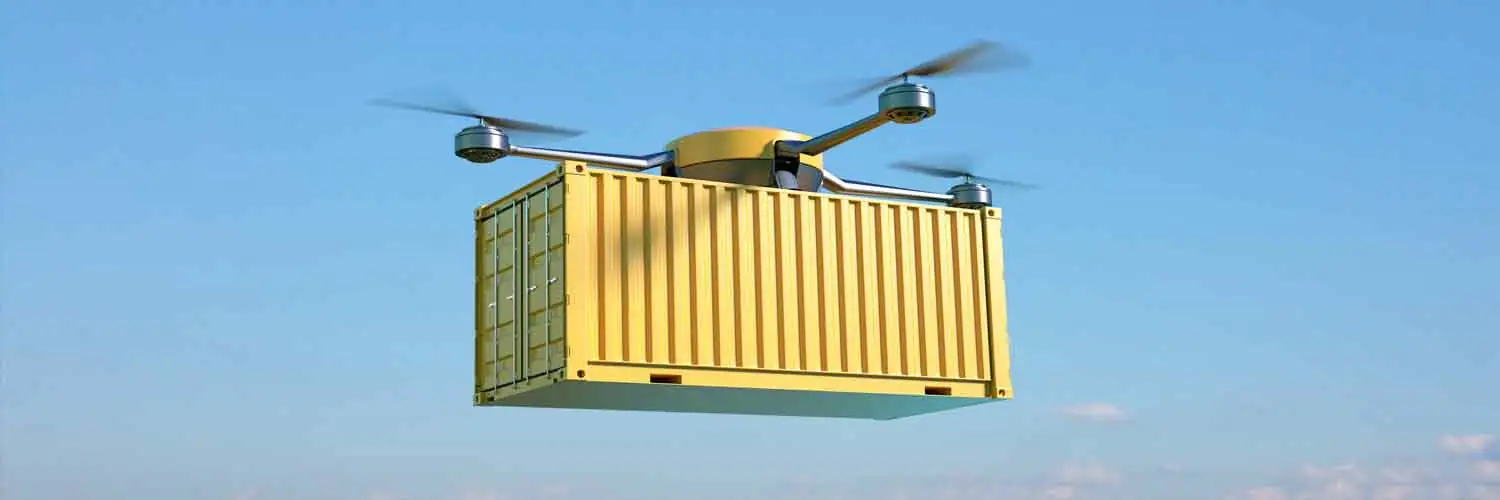If you thought the possibility of drones delivering small packages was rather futuristic, how about the idea of autonomous containers taking to the air as well?
This is no sci-fi movie plot. This is innovation within the courier and logistics industry, and if cargo drone companies and major freight carriers get their way, autonomous containers, cargo drones the size of small aeroplanes, have the potential to totally reshape the freight forwarding landscape.
It’s certainly a revolutionary concept. In a climate geared towards sustainability, clean tech and reducing carbon footprints, it could be argued that shifting the focus of deliveries from road to sky will have a positive impact in the war against pollution, but why are some of the world’s key players in the cargo and logistics space really pushing forward with autonomous aerial container technology?
Let’s look further into the possibilities of autonomous container deliveries, how they would operate, commercial advantages, interested parties to this revolutionary concept and their plans.
Autonomous containers and how they would operate
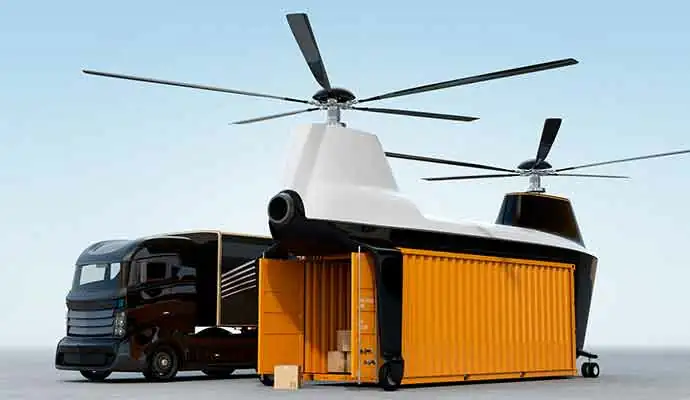

Firstly, to clear up any possible misconception, in this context the definition of a container would be similar to how you’d imagine a shipping container to be as opposed to a ‘container’ meaning a cardboard box or package you’d put something in.
Large scale, 30 to 80ft in length containers needing heavy duty helicopter style blades to transport them, the idea would be that these autonomous containers would be flown to central cargo hubs. Their detachable cargo pods would then be landed onto trucks to complete their journey without the need for runways or extra designated space as the helicopter style operating system will have vertical take-off and landing positions.
Security concerns are an ongoing issue. Initial trials and pilot schemes could only be introduced at low altitude and in sparsely populated areas. Technological issues around communications and cybersecurity will need to be addressed as well as flight regulations concerning weight limits and distances introduced before the use of autonomous containers becomes mainstream.
What are some of the key advantages to using autonomous carriers?
- Cost cutting
One of the primary reasons for considering autonomous container logistics would be from a financial perspective. Being able to take to the skies would eliminate many of the issues carriers currently face – roadworks, congestion and transportation delays, for example. These aerial containers can travel at greater speeds, deliver more orders and would be cost effective.
- Reliability
Eliminating human error and late deliveries, the use of autonomous carrier would improve reliability. Once adequate network connections are in place to support aerial container shipments, the potential reliability of autonomous logistics makes it an extremely attractive proposition.
- Ease of use for customers
As well as increased speed of delivery, the whole process of collecting and delivering consignments could be made easier. These large scale container could easily be flown from ports to container storage locations or rail freight and road transport hubs for onward delivery. Quicker turnaround benefits all parties and ultimately is far less hassle for all.
- Effective streamlining
There’s little doubt that autonomous container use would result in greater streamlining throughout supply chains. Whereas traditionally, multiple stages of transit – from warehouse, to carrier, to end user – might be involved, autonomous logistics rolls the whole process into one, resulting in a simpler transit process.
Ongoing plans and progress
In a wider landscape, the use of large unmanned autonomous carriers has already been piloted within the UK’s Ministry of Defence and its supplying organisations. Trials are underway within the Royal Navy to evaluate the efficiencies of being able to transport spare parts to submarines and equipment to military personnel via autonomous carrier methods. This not only saves both costs and human resources, but also eliminates risk to delivery personnel and assists in coping with maritime threats.
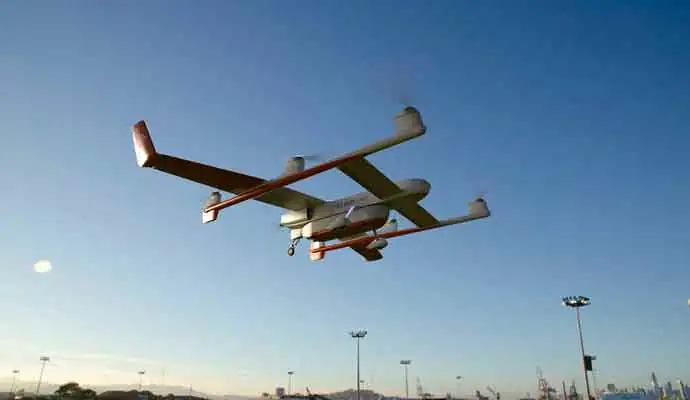
In a wider landscape, the use of large unmanned autonomous carriers has already been piloted within the UK’s Ministry of Defence and its supplying organisations. Trials are underway within the Royal Navy to evaluate the efficiencies of being able to transport spare parts to submarines and equipment to military personnel via autonomous carrier methods. This not only saves both costs and human resources, but also eliminates risk to delivery personnel and assists in coping with maritime threats.
Within the freight haulage industry, the ability to transport goods via large autonomous containers has attracted interest from major carriers such as FedEx and UPS and their investors who are keen to discover its potential. Elroy Air, a San Francisco based start-up company, is acting in conjunction with these global carriers to pioneer the technology and have successfully carried out a four day testing programme of autonomous containers at a controlled flying space in Central California. It is also reported that Elroy Air are looking to compete in the short haul (100 to 300 mile) air freight space, eventually using aerial containers to offer a faster and more frequent delivery service than that currently provided by cargo trucks or cargo planes.

Further afield, Kenyan cargo airline, Astral Aviation, have tested cargo drones and expect to use drone style containers to transport mail and packages for oil, gas and mining operation companies.
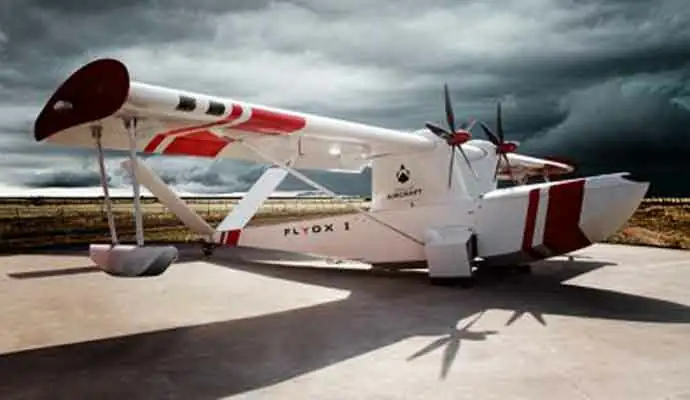

Further afield, Kenyan cargo airline, Astral Aviation, have tested cargo drones and expect to use drone style containers to transport mail and packages for oil, gas and mining operation companies .
And for the future?
Will autonomous carrier containers buzzing across our skies whilst making aerial deliveries ever become a normal occurrence within UK and Europe? The answer to this question is, yes, quite likely, although not in the foreseeable future. There are still many logistical barriers and hurdles to overcome concerning weight limits, altitudes and safety when flying over densely populated areas.
There’s also significant research still to be undertaken. Airlines, cargo handlers, aviation authorities and governments will have to collaborate with industry experts and the commercial world to establish new rules, regulations and policies. Although this cannot and will not happen overnight, road and rail infrastructures may prove unable to cope with the ever increasing demands of national and international transit. Coupled with cost savings, the use of autonomous containers could well be considered viable.
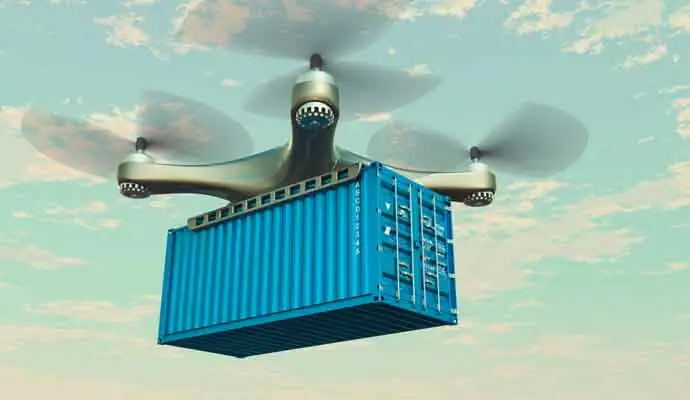
Will autonomous carrier containers buzzing across our skies whilst making aerial deliveries ever become a normal occurrence within UK and Europe? The answer to this question is, yes, quite likely, although not in the foreseeable future. There are still many logistical barriers and hurdles to overcome concerning weight limits, altitudes and safety when flying over densely populated areas.


However, with major global logistics companies such as FedEx, UPS and Amazon backing the technology and investing in automated air trials and pilot schemes, the industry must surely sit up and take notice. Once solutions to initial barriers are resolved and regulations are firmly in place, it’s possible that wide scale adoption of autonomous container deliveries will then occur.

Obviously timescales for mass implementation are as yet unknown, but perhaps the unthinkable will actually become reality. ‘Coming to an air space near you’ will no longer be a strapline exclusively reserved for science fiction movies.
Autonomous container craft are set to disrupt the freight and haulage industry. The future will indeed be air borne.
